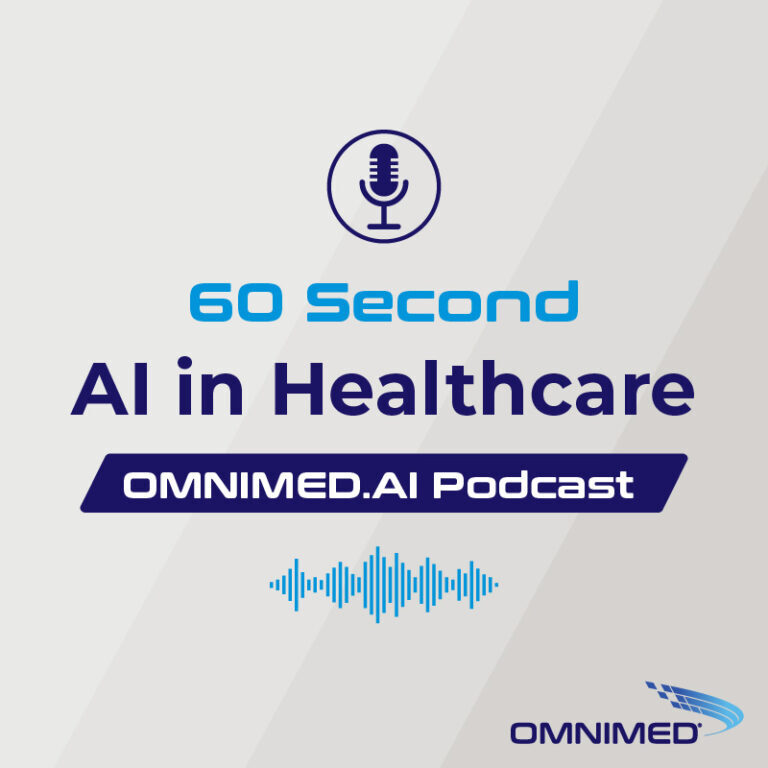60 Second
AI in Healthcare
An OMNIMED® Podcast


Listen Now
AI Opportunities in Healthcare
Episode Description
How can AI alleviate challenges for Hospital Administrators, Clinicians, and Risk teams? How does AI data analysis differ from traditional methods to enhance healthcare outcomes? And where do you begin when implementing AI in your health system?
In this episode, Damien Burgess, Chief Clinical Officer at OMNIMED, helps us understand the opportunities AI presents for healthcare providers, especially in the OR.
Episode 01 Transcript
AI-Generated Transcript
Welcome to the latest installment of Omnimed’s 60 Second Podcast, AI in Healthcare, where in just a few short minutes we keep you updated on the latest trends and technological solutions where AI is transforming the healthcare industry. In our ongoing series, we’ll cover everything from operational and clinical advancements to risk strategies and where your health system might choose to incorporate this important new technology.
Robert Brown
Hello, my name is Robert Brown. I’m the chief marketing officer here at Omnimed. In this episode we’ll be discussing the use of AI in healthcare, and specifically where it impacts the area of where about 70% of the hospitals’ revenues are generated and about 40% of the costs are incurred – it’s the hospital operating room. We’ll explore some of the applications that can improve the OR; and equally the benefits to your administrative, clinical or risk teams when incorporating this important technology. Our guest for the discussion today is Damien Burgess, the chief clinical officer here at Omnimed. Welcome, Damien.
Damien Burgess
Thank you, Robert.
Robert Brown
Damien, it seems that hospitals are under immense pressure both clinically and I think financially. We kind of look at the 6,000 plus hospitals in the US and if you look at some of the reports, their operating margin is somewhere between 1.3 and 3% which frankly for any other industry is really unsustainable in terms of their going concern. But we know the critical need for healthcare. So it seems like executive teams often highlight their OR utilization, the costs, the turnover, as the major factors contributing to this sort of financial and operational challenge. I think it’s clear that AI has the potential to revolutionize financial outcomes while ensuring clinical excellence but I guess the question to you is how can AI help alleviate these pressures both from the clinical perspective but maybe in terms of the financial improvement that the technology could provide.
Damien Burgess
That’s a good question. One of the key areas where AI can make the difference is analyzing operating room performance. It can analyze both the seen and unseen data – that includes the staff actions and workflows. This will allow a deeper understanding for the hospitals to identify patterns, gaps, and even areas of enhancement, ultimately leading to improved efficiency and patient outcomes.
Robert Brown
So how is AI analysis different than traditional reporting from the OR? You know AI certainly gives us the idea to look forward but how is that different from some of the reports that this group of users might see?
Damien Burgess
Well, traditional reports will offer insight in, let’s say, case turnover, but what AI does is it goes beyond providing actionable insights based on comprehensive data analysis. So, this will identify inefficiencies and areas of improvements within workflows, enabling hospitals to inform decisions that drive both increased case volume and also improve quality of care.
Robert Brown
Interesting. But how would a hospital go about collecting and utilizing this data? It seems a very daunting process in terms of how data can be collected and the number of staff that might be needed to collect that data. It seems like traditionally that’s been somebody standing in the corner with the clipboard observing what’s going on in the room.
Damien Burgess
Yes, it can be quite a daunting task. Typically, there is an administrator or a staff member that is inside the room with the clipboard who would be documenting data points that they would catch with their naked eye. And because it’s such a daunting task, that’s probably why 75% of the time that’s not performed. When you deploy a system like SmartOR… SmartOR is an autonomous data gathering system; we have a four discrete pods in the operating room, creating a 365 degree view of that room, and they capture millions of data points from 30 different categories all synchronized together from each case. And those data points are then put into our Power BI reports, which will actually populate a summary of your risk, your staff performance, your operating performance, and your scheduling. This enables hospitals to extract valuable insights, drive decision making, and ultimately improve both the clinical and financial outcomes for the hospital.
Robert Brown
Sounds like a game changer for hospitals. Thanks, Damien, for shedding light on how AI can transform OR management. If you have any questions for Damien not covered in the episode and want to explore other areas SmartOR can improve your OR and clinical excellence, please reach out using the contact us form below.
Damien Burgess
Thank you, Robert.
60 Second Podcast – AI in Healthcare
That concludes this episode of Omnimed’s 60 second AI in Healthcare podcast. Don't forget to tune in to the next episode to find more information on SmartOR and unique use cases that improve top line and bottom-line performance or listen to previous episodes of how SmartOR AI capabilities empower healthcare professionals.
Follow Us
Request Virtual or Live Product Demos
Schedule a virtual or live product demo to view our technologies in action. Complete the form below to request a product demonstration, and we’ll be in touch to schedule a day and time of your choice.